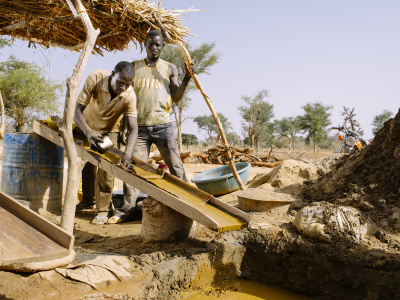
EU support to democracy: A new endowment first, a strategy to follow?
The EU has a longstanding tradition of engaging in democracy promotion, using a wide range of strategies and instruments to support processes of democratic consolidation, including in difficult contexts. While some successes have been achieved, the task of building genuine democratic systems that go beyond formal structures and help to deliver development has proven very challenging - for both local democracy promoters and international partners.
The need for “deepening democracy” has become a rallying cry in the last years. Growing attention is paid to the role of both the “political society’” (i.e. parliaments, political parties) and politically inspired (social) movements or citizen initiatives in democratic change processes. The Arab Spring confirmed these actors’ capacity to trigger change. It has also induced the EU to re-think its democracy promotion strategies. The European Parliament has even called for a “paradigm shift” in EU approaches to support democratization.
In this context Polish Foreign Minister Radosław Sikorski spearheaded the idea to create a European Endowment for Democracy (EED) in February 2011. The creation of a new instrument did not easily fit with the Council Conclusions of November 2009 in which Member States agreed that there was no need for new policies, instruments, or conditions on democracy support, but rather a need to improve how policies are implemented consistently and effectively. Nevertheless, the idea soon gained the support of the High Representative Catherine Ashton, finding its way into the joint Communication on ‘A new response to a Changing Neighborhood – A review of European Neighborhood Policy’, published in May 2011.
Creating an EED reflects the EU’s ambitions to support democratic change by engaging more deeply with political actors and activists operating in the frontline. It is also closely linked to the perceived need for a more flexible instrument to support democratic dynamics. EC instruments have been largely criticized for being too rigid and slow, too cumbersome for partners implementing them, and too risk averse. This holds particularly true for supporting governance processes or reaching out to non-traditional local actors, particularly small-scale organizations (with real legitimacy on the ground but no capacity to comply with sophisticated bureaucratic procedures).
During the Polish Presidency, heated debates took place on how a new instrument would (or would not) complement existing ones. Concerns were raised (notably by the European Commission’s DG DEVCO and the European Parliament) on the danger of duplicating the work of existing tools or diverting funds from the European Initiative for Democracy and Human Rights.
The process culminated, last December, with the creation of the European Endowment for Democracy. The Endowment, which will operate as an autonomous International Trust Fund, seeks to “foster and encourage deep and sustainable democracy in transition countries and in societies struggling for democratization” with an initial - although not exclusive - focus on the European Neighbourhood. It will award grants and provide direct support to political actors and movements.
Now that the EED has been created, the EU needs to prove that democracy support is more than a flagship initiative. What is the nature of EU’s engagement strategies towards the targeted political actors? And what are the types of outcomes to which the EED can realistically contribute through its support? Will the EU be able to make democracy promotion an integral and coherent part of various dimensions of its external action?
Is the EU ready for a 2nd generation of democracy support?
In recent years, donors have become increasingly aware that conventional technical support is unlikely to achieve political change outcomes. In order to be effective, donor support needs to address the root causes of poverty and lack of democracy. This requires gearing support towards political change processes (e.g. to unblock development-oriented reforms), supporting accountability mechanisms and actors, influencing incentive structures and shifting the balance of power. Yet, donors are still at the beginning of the learning curve on how best to do that.
Valuable lessons on what works better when engaging with political actors are emerging (see excellent research by ODI on support to political parties). These boil down to the following broad recommendations (the order does not reflect priority):
- Move away from technical and neutral approaches to democracy support;
- Start from the local context, making systematic use of ‘political economy analysis to understand societal dynamics and identify realistic opportunities for engagement;
- Be demand-driven to foster local ownership. Focus systematically on the ‘incentives’ that drive political actors;
- Be embedded in a broader theory of change and political engagement strategy (linked to parliaments, civil society, media);
- Mix political and developmental approaches;
- Broaden the toolbox. New forms of support are required including high-level political engagement, brokering, convening and facilitating dialogue processes
- Ensure flexibility all along the cycle of intervention;
- Include a risk management strategy i.e. on how to deal with the consequences of political support (for example when support to political actors conflicts with other diplomatic priorities).
- Be realistic as to what external support can actually achieve and accept uncertainty with regard to outcomes.
But there are grounds to be concerned that the EU has not yet started learning these lessons. The Declaration on the Establishment of an EED states, “the beneficiaries of the Endowment (…) will be supported in a non-partisan manner”.
Yet, supporting political actors inevitably means interfering in domestic change processes. The EU is venturing into largely uncharted territory, as well as in a political minefield. Unless the EU takes responsibility for its role as a change agent, efforts to support “deep democracy” will remain a flagship initiative, or even worse, do more harm than good.
——
Alisa Herrero Cangas is Policy Officer at ECDPM and works for its Africa’s Change Dynamics Programme.
This blog post features the authors’ personal views and does not represent the view of ECDPM.

